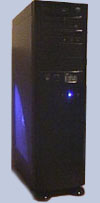| Home | |
| Fossil | |
| None More Black | |
| Lego Inside | |
| Lego Case | |
| Overclocking | |
I bought a system that had a Pentium III 550E processor and got it up and running. Surprisingly, all went well. Although overclocking is pretty easy to do with my motherboard, I wanted to hold off until I got proper cooling for my CPU. I ordered a Vantec CPU cooler and finally it arrived.
Putting the CPU cooler on was the hardest part of the entire experience. I pulled the processor out of the case, then removed the wimpy Intel fan. Taking pliers and a heavy screwdriver, I tore the plastic and metal surrounding the juicy high-tech insides. The sounds of crunching were a bit unnerving, and I kept thinking how I was invalidating the warranty in a big way. With the last of the CPU case removed, I slapped on the Vantec double-fan black matte cooler. Threw it back into the case, hooked up the fan monitor, and turned it on. Checked the CPU temperature and it was running nicely around 27 degrees Celsius, a few degrees better than normal.
Next step, overclocking. Shut down and booted into the BIOS. I took a leap from the 100 Mhz frontside bus speed up to 133 Mhz. Rebooted - no problems. My 550E was running at 733 rock solid. I kept increasing the FSB speed over and over until I finally pushed it beyond what God and man had intended. The end result? My $200 550E was running at 825 Mhz - a processor which cost around $700.
All-in-all, it was a pretty exciting experience. Not only did I save a bundle in processor costs, but I had a great time doing it myself. Sure, I have a couple quirky things like the network card doesn't work in my new system, but they're pretty minor. Plus, going from my old 300 Mhz processor to this one is an amazing improvement.
- Posted 5/14/00
Back to case modifications

None More Black
Overclocking Sites
[H]ard OCP
Overclockers.com
